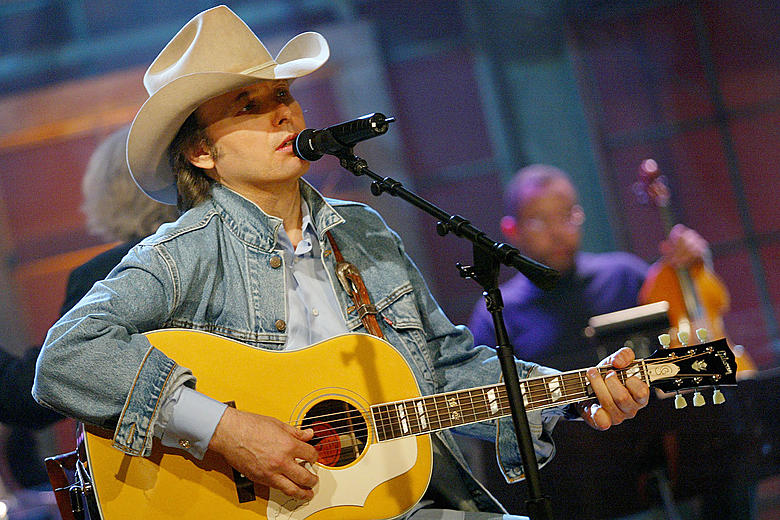
A barstool truth told gently—a promise that pain’s just a swallow away, even as the singer knows better and keeps time with the ache.
Essentials up front. Song: “It Won’t Hurt.” Artist: Dwight Yoakam. Album: Guitars, Cadillacs, Etc., Etc. (Reprise, debut studio LP, March 12, 1986). Writer: Dwight Yoakam. Producer: Pete Anderson. Single release: November 3, 1986—the album’s third single—B-side: “Bury Me” (the album duet with Maria McKee). Length: 3:03. Peak charts: No. 31 U.S. Hot Country Singles, No. 7 RPM Canada. On screen: the song rides over the outro of Yoakam’s “Honky-Tonk Man” video.
For older ears, “It Won’t Hurt” is the kind of country record that feels like good company at closing time—no fireworks, just the right words in the right voice. It arrives near the end of that first great radio run (after “Honky Tonk Man” and “Guitars, Cadillacs”) as the quiet confession of the set: a man trying to outtalk his own heart while the band keeps him upright. Even the single’s paperwork underlines its modesty: Reprise 28565, paired with “Bury Me.” And while it didn’t climb as high as the first two hits in the U.S., Canada heard its truth and sent it into the Top 10.
The sound is a primer in Bakersfield discipline—that crisp, drum-tight California approach Yoakam and producer-guitarist Pete Anderson brought back to mainstream country in the mid-’80s. The snare lands like a metronome with a pulse; the bass walks a half-step behind; Telecaster replies cut short and true; fiddle shades the edges; the steel sighs but never weeps. Anderson keeps it dry and close, the way those Capitol/Excalibur rooms rewarded honest playing, and Yoakam rides just behind the beat so the title line—it won’t hurt when I fall down from this barstool…—lands like something you might actually say out loud to a friend who knows you too well. The album’s credits and studio notes (Excalibur Studio City; Capitol Studio B) put you right there in that sound.
Part of the record’s glow is its pre-history. Long before Reprise, “It Won’t Hurt” was already on Yoakam’s 1984 indie Oak Records EP, leading Side One; two years later, when the major-label LP arrived, it took Track 2—a vote of confidence that this lean little barroom lament carried the voice of the project. That arc—EP opener to album cornerstone to third single—is why lifers hear something foundational in it. It’s not just a cut; it’s a creed about how to tell the truth.
Critics heard it, too. Billboard called the track a “classic hurtin’ and drinkin’ song”—praise as old-school as the performance—and Spin singled out the album’s “unadulterated hayseed” snap as part of its charm: fiddles, banjos, and a sense of play that travels beyond genre borders. Taken together, those notices explain why a modest No. 31 stateside can still feel like a standard three decades on: it’s built sturdily and sung with a grin that can’t quite hide the bruise.
Listen to how the lyric works. Yoakam writes in plain snapshots—empty glass, stubborn pride, that familiar pact with the next round. There’s no sermon in it; there’s denial with rhythm, a man trying to alibi his pain with company and motion. Country songs have worn that hat forever, but this one wears it light. The chorus doesn’t thunder; it shrugs. And the band’s refusal to grandstand lets the shrug speak louder than any crescendo. On the video side, that decision to tuck the tune into the “Honky-Tonk Man” outro is a sly wink: the hit pays the bar tab, and this little truth walks you to the door.
For those who keep the paper trail tidy, a few more notes: the album Guitars, Cadillacs, Etc., Etc. launched Yoakam’s run of three straight No. 1s on Top Country Albums, sealing the partnership with Pete Anderson that would define his late-’80s sound; and a demo of “It Won’t Hurt” later surfaced on the 2002 box Reprise Please, Baby and again on the 2006 deluxe reissue of the debut—useful waypoints for hearing how little the song needed changing once the pocket and vocal fell into place.
Play it now and you’ll recognize the kindness of restraint. The melody asks nothing fancy of you; the rhythm offers a steady arm; the singer doesn’t pretend he’s bulletproof—he just hopes the fall won’t sting. That humility is why the record lingers. For many of us, the late hour got quieter as the years went on, and songs like “It Won’t Hurt” learned to sit with us there—barroom wisdom without barroom noise.
Verified highlights: Song “It Won’t Hurt” (Yoakam), single released Nov 3, 1986; from Guitars, Cadillacs, Etc., Etc. (March 12, 1986); producer Pete Anderson; length 3:03; B-side “Bury Me”; peaks: US Country No. 31, Canada No. 7; appears in the outro of the “Honky-Tonk Man” video; first appeared on Yoakam’s 1984 Oak EP; demo included on 2002 box/2006 deluxe.